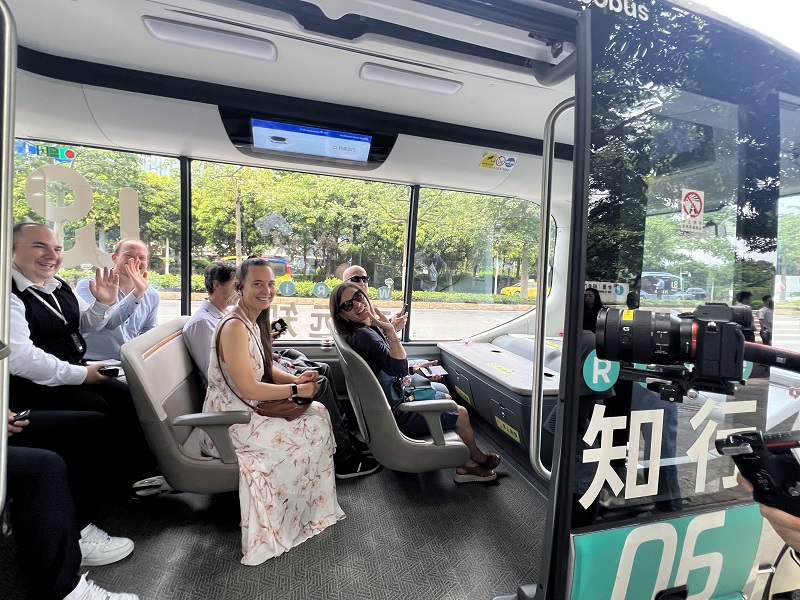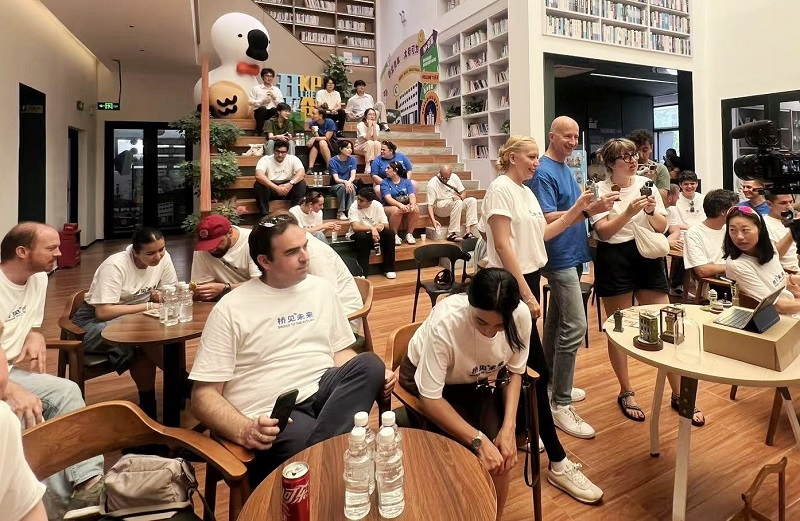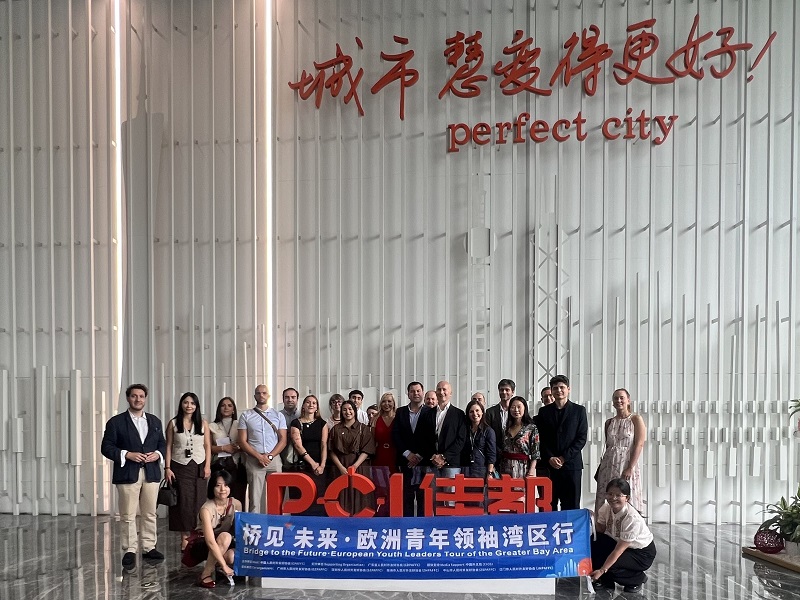Against the backdrop of the 25th China-EU Summit, where leaders emphasized the importance of stable bilateral ties amid global challenges, a delegation of European youth leaders is actively exploring pathways to bring Chinese innovation to their home countries. Their tour of China’s Guangdong-Hong Kong-Macao Greater Bay Area underscores a shared commitment to technological collaboration.
Experiencing Innovation Firsthand
Organized by the Chinese People’s Association for Friendship with Foreign Countries, the “Bridge to the Future: European Youth Leaders Tour of the Greater Bay Area” began in Guangzhou, the capital city of south China’s Guangdong Province, on July 23, where participants experienced WeRide’s autonomous buses firsthand.

European youth leaders experience a ride in WeRide’s autonomous Robobus in Guangzhou on July 23, 2025. (China Today)
“It’s amazing. I truly hope my country adopts Robobuses,” Sabina Mihailescu, co-founder and General Manager of DearNeighbour, the first Romanian-born initiative aiming to transform urban communities into sustainable hubs, told China Today. “Our current buses are outdated and heavily polluting – change is urgent.”
Hungarian PR firm owner Mate Koczka echoed this enthusiasm after visiting WeRide and AI specialist PCITECH. “The modern, high-tech solutions surpassed my expectations. I’d welcome these innovations in Hungary – self-driving vehicles, AI-powered camera systems, and traffic management. They’re incredibly impressive and would greatly benefit us.”
Many delegates expressed astonishment at how AI-driven solutions are transforming daily life, workplaces, and urban governance. Inspired by these applications, they’re actively seeking Chinese partners.
Matias Acosta, CEO of a U.K.-based AI solutions provider for HVAC (Heating, Ventilation, and Air Conditioning) systems, noted: “Observing strategic AI developments here aligns perfectly with my company’s focus. Smart cities powered by electric mobility are our domain. I came to study advancements in hardware and AI – China’s manufacturing and technological sophistication is remarkable, and we already integrate Chinese components.”
Acosta’s firm develops real-time comfort optimization software for commercial building air conditioning, aiming to reduce costs and enhance well-being. “We need specialized hardware, which China excels at producing. We’ll collaborate with local manufacturers to deploy our AI layer in their systems,” he added, confirming plans to meet potential partners during his visit.
Aligning with Broader Cooperation Goals
While meeting with President of the European Council Antonio Costa and President of the European Commission Ursula von der Leyen, President Xi called on both sides to strengthen green and digital partnership, and boost mutual investment and cooperation.

European youth leaders engage with local entrepreneurs at a Jiangmen cultural and tourism incubation base during their Greater Bay Area tour on July 24, 2025. (China Today)
Austrian investor Stephan Katzgraber, focusing on recycling technology, sees China’s leadership in green tech as pivotal. “Chinese firms lead in areas like AI-powered sorting machines.” He aims to partner with Chinese companies to introduce these solutions to developing countries in South America, where demand for efficient waste management is surging.
A WeRide manager confirmed growing European interest. “Many European companies proactively seek collaboration after knowing our autonomous driving technology.” The firm’s Robobuses already operate in European cities including Barcelona, Zurich, and Paris.
Sowing Seeds for Future Collaboration
President Xi’s remark during his meeting with European leaders – “History and reality show interdependency isn’t a risk, and convergent interests aren’t a threat” – resonated with the youth leaders. While some European politicians advocate “de-risking,” business and public sentiment diverges.

European youth leaders pose for a group photo at PCITECH’s headquarters in Guangzhou on July 23, 2025, during the “Bridge to the Future: European Youth Leaders Tour of the Greater Bay Area,” organized by the Chinese People’s Association for Friendship with Foreign Countries.
Geopolitical thinking is largely confined to politicians, Mihailescu observed. “Consumers embrace Chinese products like smartphones and robot cleaners for their convenience.” Katzgraber anticipates more affordable, high-quality Chinese EVs entering Europe. “People judge based on real quality, not politics.”
“It is vital to gather here with the next generation of global leaders and analyze the extraordinary opportunities ahead,” said Jacobo Garcia, president of the Global Youth Leadership Forum, in his speech at the July 23 event, “The Bridge of Openness: Discover Guangzhou’s Opportunities.” He stressed: “Our world is evolving rapidly, and these future leaders must grasp the strategic partnership between the European Union and China. This understanding is key to providing solutions that foster greater peace and prosperity for the citizens of our nations.”
Talking about the China-EU Summit, Javier Hurtado Mira, Chairman of Democrat Youth Community of Europe, emphasized openness. “We must keep all doors open for friendship and cooperation between nations.” Visiting Guangdong deepened his appreciation for China’s technological advancement and openness. “This openness presents valuable opportunities,” he noted. “Europeans should engage with China, and Chinese investors should explore Europe, building bridges that strengthen both continents’ economies.”
Hurtado expressed strong optimism about youth leaders’ role in fostering cooperation. “Young entrepreneurs possess a distinct advantage: they’re unburdened by the past. Their focus is squarely on peaceful collaboration and the future, rather than past ideological divisions. This forward-looking approach, centered on mutual benefit, holds great promise. While only time will tell, I’m confident in its potential.”
Michele Orzan, President of the European Chamber of Commerce, highlighted the need for equilibrium. “We strive to balance society’s fundamental pillars – people, planet, and prosperity – ensuring they operate in harmony. Business prosperity should serve societal well-being, while environmental stewardship remains imperative for future generations.”
This also echoes China’s advocacy to jointly advance an equal and orderly multipolar world and a universally beneficial and inclusive economic globalization.